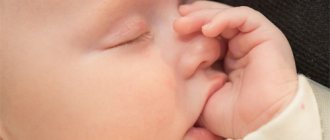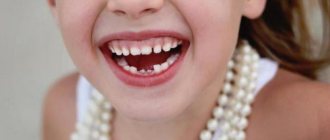When a 2-year-old child grinds his teeth, most parents panic. Teeth grinding is a symptom of a disease called bruxism. To determine why a 2-year-old child constantly grinds his teeth, you should not only show the baby to the doctor. It is necessary to monitor the child’s emotional state and undergo additional examinations. Teeth grinding should not be ignored. If the problem is ignored, it can develop into serious illnesses. In today's article we will look at the reasons why a 2-year-old child grinds his teeth during the day and in other cases.
Where does the grinding noise come from?
To establish the cause of the development of bruxism, it is first necessary to determine where the grinding comes from. If a 2-year-old child grinds his teeth in his sleep, this indicates contractions of the masticatory muscles. In normal condition, dental units can come into contact only during eating, causing friction. When the jaws are relaxed, they touch, but no friction occurs. If a 2-year-old child begins to grind his teeth, it means that the jaw muscles are very tense and the teeth are pressed tightly against each other. Bruxism is quite common. Doctors diagnose almost every third or fifth baby with this disease. According to statistics, male children are more likely to face this problem.
Bruxism often develops in adults, but much less frequently than in children. Bruxism can occur not only during the day, but also at night. More often the sounds are heard for a few seconds. If an alarming symptom occurs periodically, and the baby’s condition does not change, parents need not worry. If you notice that a 2-year-old child intentionally grinds his teeth or does it involuntarily at night, you should show the baby to a pediatric specialist. Often with bruxism, children wake up in the morning lethargic and moody, and may complain of headaches and discomfort in the jaw. Treatment is usually prescribed in cases where teeth grinding attacks persist for more than a month.
What is bruxism and where does it come from?
Doctors call uncontrolled grinding of teeth bruxism (from ancient Greek this word is translated as “teeth grinding”). In children, attacks of bruxism most often occur during sleep - its deep phase - or during moments of strong emotions.
Experts don't yet know BRUXISM the exact reasons that cause children to grind their jaws. However, some connections were established. Thus, involuntary contractions of the masticatory muscles are often associated with the following factors.
The child is cutting baby or permanent teeth
Teething is a rather painful process. At the same time, the gums itch, and the baby unconsciously clenches his jaw to drown out the unpleasant sensations.
It's a matter of uneven bite
It happens that the upper and lower teeth do not fit well together, which is why the jaw cannot be closed. This causes discomfort to the child, and he moves his jaws back and forth, trying to find a position in which the teeth would not interfere with each other.
Jaws don't have enough load
This situation is common in children older than a year and a half, who for some reason do not receive enough solid food. For example, because the mother is sure that the child has enough breast milk. During the day, the jaw muscles do not receive the necessary load, and the body tries to compensate for this at night, causing the jaw muscles to contract. Teeth grinding is a side effect of this process.
The child is stressed
Nervous stress can cause hypertonicity of the masticatory muscles. During the day, the baby controls the movements of the facial muscles. But at night, control decreases, and the jaw literally cramps.
Every child has their own stress threshold. For some children, even a trivial quarrel with their parents or siblings is enough for them to start desperately grinding their teeth at night.
A child may also grind his jaws in those moments when he is having an emotionally intense dream.
Bruxism is also often observed in hyperactive children.
The child is sick
Seasonal allergies and upper respiratory tract infections - acute respiratory viral infections, influenza, sore throat - lead to nasal congestion. The baby is forced to breathe through his mouth, that is, to open and close his jaws. Sometimes, when closing, he squeezes them too tightly, to the point of grinding his teeth.
Bruxism can also be an attempt to drown out pain in the ear canal if a child has otitis media.
No, these are not worms!
Let's put this in a separate paragraph - for the reason that many people associate teeth grinding with the presence of parasites in the body. This is a myth: there is not a single scientific evidence that helminths provoke bruxism.
A 2-year-old child grinds his teeth: Komarovsky’s opinion
If a child grinds his teeth, first of all it is necessary to determine the reasons for this phenomenon. Dr. Komarovsky identifies the following causes of creaking:
- Specifics of the child's psyche. It is necessary to understand that children endure stress and stress emotionally, differently than adults. The slightest stress can have an extremely negative impact on a child’s body. A common cause of bruxism is mental stress. When a child constantly grinds his teeth, this may indicate that a serious malfunction has occurred in the baby’s nervous system. The baby cannot control the grinding and needs help.
- Another reason why a child may grind their teeth is due to the period of eruption of baby teeth. Sometimes bruxism occurs when the bite changes. This is not relevant for children two years old, but it is often found in children one year old. When a tooth erupts, it causes severe discomfort, so the baby tries to scratch his teeth and grinds them. It is necessary to take into account that during the period when the first teeth are cut, daytime bruxism is observed.
- Incorrectly developed bite. With diseases of the jaw joints and malocclusion pathologies, teeth grinding may occur at night.
- Another reason that Dr. Komarovsky highlights is heredity. If mom or dad suffered from bruxism, then the risk of the problem developing in children is very high.
- Bruxism at night is observed in the sleep of a child who sleeps poorly, suffers from nightmares, and suffers from sleepwalking. This problem can affect babies who snore and talk in their sleep.
- A runny nose and otitis media can also cause teeth grinding day and night.
- Komarovsky also identifies the cause of bruxism - a deficiency of B vitamins and various microelements. The child should eat a balanced diet, regularly eating a variety of healthy foods.
- If the load on the jaw is insufficient, the baby eats a lot of soft food, then the jaws can reflexively clench at night.
Some parents mistakenly believe that if a 2-year-old child grinds his teeth at night, this is the first sign of the presence of parasites. This opinion is especially common among older people, but there is no direct connection between bruxism and worms in the body. Children with helminthic infestation experience discomfort, which can manifest itself in the form of teeth grinding at night. The reasons why a 2-year-old child grinds his teeth can be very diverse. To correctly determine the cause of bruxism, day or night, the child must be shown to a pediatrician.
Causes of teeth grinding in children
Many children grind their teeth either unconsciously in their sleep or during the day. This phenomenon has several explanations, so it is not always possible to pinpoint why children grind their teeth. In any case, if you hear that your child is grinding his teeth during the day, you should not self-medicate , but rather make an accurate diagnosis.
- Mental instability. The most common reason is the instability of the baby’s psyche. The baby cannot express emotions or fullness of feelings and conveys aggression or excessive excitement through squeaking. By the way, in adults who are able to completely control their thoughts all the time except sleep, creaking occurs for the same reason. At night, the body works unconsciously. Relaxers and sedatives will help cope.
- Erupted teeth. During the day and during sleep, the creaking may be due to recently erupted teeth - this condition is new to the child, which is why he creaks with his newfound knowledge. Everything will pass when the baby gets used to the new state of affairs. Such creaking poses no danger to the health of the gums or the child’s behavior.
- The earth is full of rumors. Popular rumors say that if a child grinds his teeth, then his body is affected by helminths. However, medicine refutes all such rumors , because there is no connection between bruxism and helminths from a medical point of view. Nevertheless, it would not be superfluous for either a child or an adult to check.
- Heredity. Heredity can also be an equally important factor in teeth grinding. Probably one of the relatives suffered from this disease and the child inherited this feature. In this state of affairs, it is unlikely that it will be possible to get rid of the manifestation; all that remains is to wait for the habit to disappear.
- Malocclusion. An incorrect bite can cause grinding of teeth, since if the position is incorrect muscle tension is observed , and by “scratching” the teeth against each other, this discomfort can be quickly relieved. The dentist can help by correcting the wrong places or prescribing braces to straighten the teeth, but it is worth remembering that such correction is only possible at school age and beyond.
- Enlarged nasopharyngeal tonsils. Creaking may appear due to enlarged nasopharyngeal tonsils, since larger adenoids lead to difficulties when the child breathes during sleep, and this leads to wheezing and grinding of teeth.
- Lack of calcium. It happens rarely, but sometimes a child grinds his teeth from a lack of calcium. This element is very important, and its deficiency allows the enamel to become thinner, which leads to discomfort. The baby simply tries to eliminate it by grinding or chewing, and this leads to incomprehensible and unpleasant sounds.
Why do 2-year-old children grind their teeth only during the day or at night?
Why do some children grind their teeth at night, while others only grind during the day? It is worth considering that daytime grinding is more observed in emotional children aged two to three years. Even the slightest problem can provoke a storm of emotions in a child. He reflexively clenches his teeth, making a characteristic sound. There are also cases when the baby constantly and deliberately grinds his teeth. Pediatric doctors often attribute the phenomenon when a child grinds his teeth during the day at 2 years old not to a pathology, but to a habit. In this situation, a competent child psychologist can help the child. When children at two years old deliberately grind their teeth, a delicate approach is needed to teach kids to control their every action. Under no circumstances should children be punished for grinding, otherwise this will make the problem worse.
There are many techniques that allow specialists to wean children from bad habits. In a dream, a baby cannot deliberately grind his teeth, since grinding occurs involuntarily. Nocturnal bruxism may be accompanied by other symptoms: teeth clicking and grinding. This can last no more than fifteen seconds. If you notice that your baby begins to constantly grind his teeth in his sleep, you should pay attention to this and seek help.
What to do if your child grinds his teeth in his sleep
In most cases, nothing. By the age of 7–8, children safely and completely without consequences outgrow the stage of teeth grinding.
But in some children, bruxism is accompanied by unpleasant side effects:
- increased wear of tooth enamel - chips, accelerated development of caries, exacerbation of teeth sensitivity to temperature;
- headache or ear pain;
- problems with the temporomandibular joint.
If this is your case, consult your pediatrician or dentist. Your doctor will help determine the most likely cause of bruxism. If it is related to the structure of the teeth or itching during teething, the dentist will correct this problem. For example, he will recommend special protective pads that will need to be placed in the baby’s mouth while sleeping.
If a child grinds his teeth due to stress or increased nervous excitability, he will need the help of a psychologist or neurologist. This is an important point. Bruxism may continue until the stress subsides. Without the help of a specialist, this process sometimes drags on for decades.
Why treatment is needed
Moms and dads often ask doctors whether their baby needs medication for bruxism. If, after diagnosis, the doctor determines that this condition is not a pathology, you can do without drug therapy. Otherwise, treatment will be required to eliminate possible complications in the future. Teeth grinding can lead to the development of various diseases. Below we will look at the dangers of bruxism:
- Constant sleepiness during the day. Since the child cannot fully rest at night and his muscles are constantly under tension, waking up does not bring cheerfulness. The baby will feel lethargic and unrested.
- Impaired cognitive functions. Children begin to have trouble concentrating on simple tasks and their attention wanders.
- Erasure of tooth enamel. Active work of the jaws, day or night, is a constant impact on tooth enamel. In children aged two years, the enamel is not yet strong and is not resistant to abrasion. This results in increased sensitivity of the teeth. If the baby begins to react sharply to sour or sweet, hot or cold, you need to contact a specialist as soon as possible.
- Malocclusion. It is a consequence of increased abrasion of tooth enamel.
- Disorders of the nervous system. Neurological disorders can occur if bruxism is left untreated for a long time.
- If your baby begins to frequently complain of headaches or discomfort in the jaw area, this is also a reason to consult a doctor.
Diagnosis of bruxism
If parents notice symptoms of bruxism, they should carefully monitor their child's sleep. It is also necessary to check how often the attacks last and at what time the grinding occurs. It is also very important to determine whether there are any associated problems and what the general condition of the child is. Only a doctor can accurately determine the cause of the problem and prescribe effective treatment. More often, doctors recommend polysomnography. Diagnostics will help identify involuntary contractions of the jaw muscles.
This technique will make it possible to distinguish bruxism from hidden serious pathologies. This study is especially relevant for children with an increased risk of developing epilepsy. A pediatric dentist can diagnose bruxism. Bruxism can be accurately determined by a special mouthguard that children wear at night. In the morning, the condition of the product is assessed. If deformed areas are found on the mouthguard, it means that there was a load in these places. It is also advisable to consult with a neurologist and child psychologist.
What to do if your child grinds his teeth
You should always pay attention to the baby's condition. If the baby eats normally, sleeps, his mood is normal, but grinding noises occur periodically, there is no need to worry. In this case, you can limit yourself to general treatment recommendations that the doctor will provide. Doctors recommend adjusting the baby’s daily routine. The child needs to be in the fresh air as much as possible and go to bed to rest in a timely manner.
It is also important to create the right diet. Food enriched with vitamins and microelements will help avoid the development of many diseases. Eliminate from your diet foods that contain dyes and preservatives. Fatty and heavy foods for the gastrointestinal tract should be excluded. Try not to overfeed children at night, as this can cause restless sleep. Be sure to give your baby solid food during the day to develop chewing muscles. Before bedtime, you should not play active outdoor games with children. If your baby is overexcited before bedtime, he will not be able to fall asleep normally. Parents should create the most favorable atmosphere in the house.
Treatment methods
It is imperative to provide psychological support to a child who suffers from bruxism. An experienced child psychologist will help the baby overcome the problem. A dentist can treat complications of bruxism. Drug therapy involves taking special medications. Sometimes children are prescribed Tenoten or Glycine to relieve stress and normalize sleep. The following will be useful:
- Soothing baths.
- Massage.
- Warm compresses on cheekbones.
- Wearing a night guard.
If you suddenly notice regularly recurring teeth grinding in your child, you need to immediately pay attention to this. Under no circumstances should you self-medicate. After an examination, a competent doctor will prescribe additional tests to correctly diagnose the disease.
If a 2.5 year old child grinds his teeth, you should pay close attention to this phenomenon. If we are talking about pathology, then serious treatment may be required, the regimen of which should be drawn up by a competent and experienced doctor.
What is bruxism and why do children grind their teeth? Part 2. Why does a child grind his teeth?
The first we can name is the child’s psychological problems, stress. Children are very sensitive, so stress can be caused in them by a seemingly unimportant reason - a conflict on the playground, reluctance to go to kindergarten, the transition from a carefree childhood to school discipline, resentment towards parents. Or even - intense joy, a long-awaited gift. Therefore, you should always be aware of your baby’s internal experiences and it is advisable to dose both negative impressions and positive emotions. Serious illnesses in a child cause him great anxiety and fear for his life, which can also manifest itself in night tension and teeth grinding.
The second prerequisite is the baby’s sleep problems. It happens that the child’s sleep phases are disrupted or he has nightmares. Such experiences during sleep dramatically increase the risk of why a child grinds his teeth in his sleep.
A genetic predisposition to grinding teeth at night also plays an important role. Boys are more often prone to this hereditary factor. If one of the parents suffered from bruxism in childhood, then the son will probably have the same problem. Girls are several times less likely to grind their teeth.
Adenoids. It has been observed that more than 80% of children who have noticeable problems with enlarged adenoids grind their teeth at night. It even happens that a child grinds his teeth during the day if his nasal breathing is severely impaired.
Parents of infants get terribly scared when their 8-month-old child grinds his teeth. Although this phenomenon quite often accompanies teething. After all, swollen gums are very itchy, and the child rubs them against each other and clenches his jaw. If you find clear signs of the rapid eruption of a new baby tooth, lubricate the gums with special cooling gels, or give chilled teething rings. The grinding noise will go away or be reduced to a minimum and will only remain during sleep. Daytime teeth grinding can most often be caused by teething - the baby is simply interested in making different sounds with his new teeth. In this case, it is enough to explain to the child that it is impossible to do this or simply prohibit it.
A more serious cause may be problems with bite and congenital malformation of the jaws. When a child grinds his teeth at night , the best way to solve the problem is to contact a qualified dentist in our clinic. Only a doctor can identify malocclusions, even if they are not very apparent outwardly. A pathological bite or abnormal jaw growth cannot be ignored and must be treated, because the subsequent health of the child depends on it. Moreover, modern dentistry allows you to correct malocclusions in almost 98% of cases and guarantee a full life for your child. (“Treatment of malocclusions”). In almost half of the cases when a child has no teeth in the dentition or, conversely, has supernumerary teeth, regular teeth grinding is observed.











